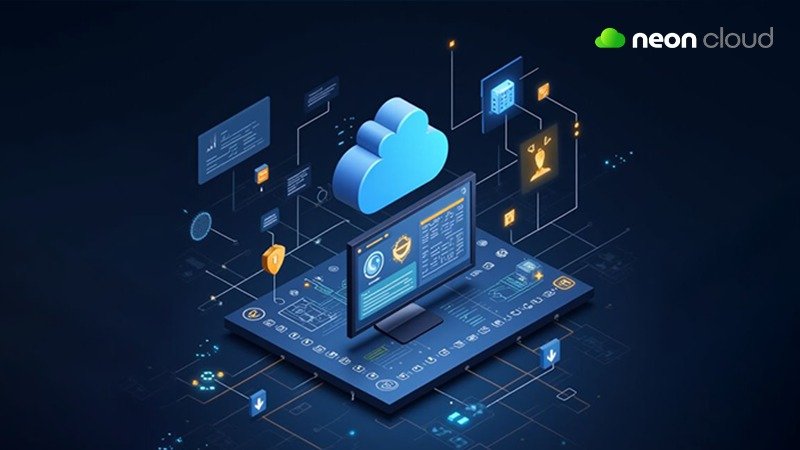Understanding Virtual Private Cloud Subnets and Routing: A Beginner’s Guide by Neon Cloud

The fact is that terms like virtual private cloud, subnets, routing tables, and virtual machines sound too complex. However, it is important to understand these terms in case you desire to develop secure, scalable, and efficient cloud-based applications.
At Neon Cloud, we feel that cloud infrastructure should be easy, affordable, and powerful. You might be a developer, an entrepreneur, or a tech-savvy business owner, but this handbook is what will take you through the basics of cloud computing, especially in areas of a Virtual Private Cloud (VPC), subnets, and routing, and how those fit into your cloud strategy as a whole.
What Is the Cloud?
The cloud is the name of web-based servers where you can save data, execute programs, and carry out computing. The cloud enables you to use rented computing resources and storage space instead of dealing with local hardware or servers.
Whenever you are streaming music, storing files on Google Drive, or running an e-commerce site, you are in the cloud. It is portable, affordable, and accessible anywhere.
What Is a Virtual Cloud Server?
A Virtual Cloud Server refers to a software copy of a physical server that operates within a cloud. It is a virtual server hosted in the shared infrastructure, which functions as any traditional server. You have total control over the operating system, applications, and configuration, and you no longer need to manage or maintain the hardware.
Our virtual cloud servers at the Neon Cloud are based on a high-performance virtual machine. They offer a safe and elastic host to store websites, applications, and databases, thus, have full scalability when it comes to compute resources, storage, and networking access.
What Is a Private Cloud?
A Private Cloud is an isolated cloud environment that is exclusive to a single organization. In contrast to public cloud solutions, wherein various users may share the same infrastructure, only you have access to your own servers, storage, and networks in a private cloud.
It is the best option to choose when a firm requires:
- Full management of their infrastructure
- Improved security of data
- Regulatory compliance
- Customized configurations
Think of it as renting an entire building rather than just a desk in a shared office.
What Is a Virtual Private Cloud (VPC)?
A Virtual Private Cloud combines the advantages of the cloud (flexibility, scalability, cost-efficiency) with the security of a private network. It’s essentially a logically isolated section within a public cloud platform where you can launch virtual cloud servers, store data, and control access—all in a secure environment.
A VPC allows you to:
- Define your IP address ranges
- Create subnets for different types of resources
- Set up routing tables to control traffic flow
- Use firewalls to secure your resources
With Neon Cloud, setting up a VPC is quick and intuitive. You get full control over how your cloud infrastructure is organized, accessed, and secured.
What Are Subnets?
Once your VPC is created, the next step is dividing it into subnets. A subnet (short for “sub-network”) is a segment of your VPC’s IP address range where you group related resources.
Why use subnets?
- Organization – Separate front-end, back-end, and database servers for better manageability.
- Security – Keep sensitive resources like databases in private subnets inaccessible from the public internet.
- Performance – Optimize routing and load balancing between resources.
For instance, you might create:
- A public subnet for a Cloud Virtual Machine that hosts your website or application
- A private subnet for internal databases and back-end services
Each subnet helps maintain a clean, secure, and efficient architecture.
What Is Routing in a VPC?
Routing refers to how traffic is directed within your VPC and between the internet, your subnets, and other cloud services.
A routing table defines the rules that determine how data moves between subnets or reaches external networks. Each subnet is associated with a routing table, which includes:
- Destination IP addresses (where the traffic is going)
- Next hop (where the traffic should be sent)
For example:
- Traffic destined for the Internet might be routed through an Internet gateway
- Internal traffic between subnets may be routed through a local route
This setup ensures that data reaches the correct destination securely and efficiently.
With Neon Cloud, you can easily configure and customize routing rules to meet your application’s architecture and security needs.
The Role of Firewalls and Access Controls
Security is central to any virtual private cloud setup. That’s where firewalls and access control rules come in.
In a Neon Cloud VPC, you can define:
- Which IP addresses can access your resources
- Which ports are open (e.g., for HTTP, HTTPS, or SSH)
- Which virtual machines can communicate with one another
This allows you to secure your environment and ensure that only trusted sources have access to critical infrastructure.
Why Does All This Matter?
A properly configured Virtual Private Cloud ensures that your digital infrastructure is:
- Secure – Keep sensitive data protected with subnets and access controls.
- Organized – Structure your resources logically with subnets and routing.
- Scalable – Add or remove virtual machines as your needs evolve.
- Efficient – Route traffic intelligently to minimize latency and cost.
Whether you’re launching a small website or building a complex enterprise system, a VPC gives you the foundation you need for reliable, high-performance cloud operations.
Start Building with Neon Cloud
At Neon Cloud, we offer robust tools and infrastructure to help you build, manage, and scale your cloud environment with ease. Our Virtual Private Cloud solutions are designed for simplicity and performance, making them perfect for startups, developers, and growing businesses.
With intuitive controls, high-speed virtual machines, and industry-grade firewalls, Neon Cloud puts robust infrastructure at your fingertips.
Visit neoncloud.com to get started and explore our complete suite of cloud solutions.